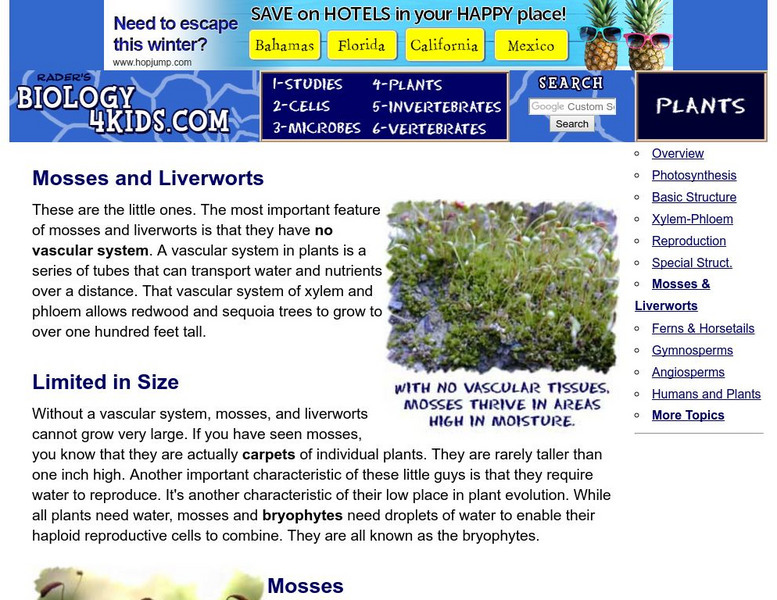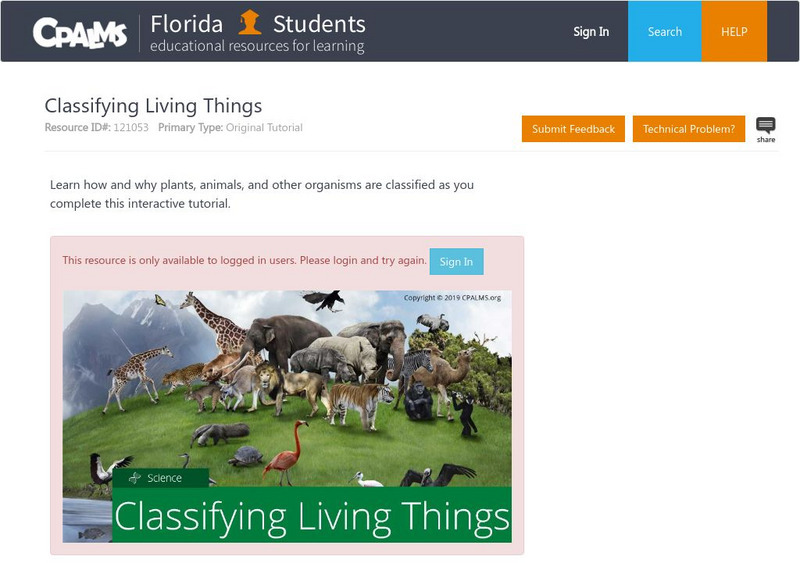Scholastic
Study Jams! Mosses and Ferns
Mosses and ferns are some of the world's oldest types of plants. Here is a quality 10-slide presentation set to gentle background music for beginning botanists to view and enjoy. Accompanying captions explain that these are both...
Scholastic
Study Jams! Plants without Seeds
Non-vascular plants do not develop seeds in order to reproduce. There are also some vascular plants that do not put out seeds. By viewing and reading through these six slides, green thumbs learn about mosses, liverworts, and ferns. They...
K-State Research and Extensions
You Ol’ Fossil
Geologists are gneiss, tuff, and a little bit wacke. The fifth chapter of seven includes ten activities at four different levels. The hands-on activities cover fossils including how they are formed, vertebrates, invertebrates,...
Curated OER
Non-Seed Vascular Plants
In this non-seed vascular plant instructional activity, students review the characteristics of sporophytes, lycophytes, sphenophytes, and pterophytes. This instructional activity has 19 fill in the blank, 4 true or false, and 2 short...
Curated OER
Characteristics of Plants
For this characteristics of plants worksheet, students name two things that all plants have in common. Then they describe how the cell walls and cuticles help plants adapt to life on land. Students also explain the difference between...
Curated OER
Plants
Student identify the characteristics of plants. Through hands-on demonstration, they create a model of plant parts. High schoolers differentiate between the major divisions of the plant kingdom with a particular emphasis on the...
Curated OER
Plants and Animals Crossword Puzzle
In this science worksheet, students look for the answers to the questions to fill in the crossword puzzle using the theme of pants or animals.
Curated OER
Plants: Form and Function
For this plants worksheet, students compare and contrast vascular and non-vascular plants. Students learn the structure and function of the 3 types of plant tissues: dermal, ground, and vascular tissue. This worksheet has 27 fill in the...
Curated OER
Plant Life
Seventh graders examine different categories of plant life and their roles as producers of food and oxygen for other organisms. They study the evolution of plants from simple organisms to very complex ones. They look at the different...
Alabama Learning Exchange
What Kind of Plant is it?
Students evaluate the differences between vascular and nonvascular plants and practice classifying the plants into categories. They demonstrate using drawing software to create two slides showing vascular plants and nonvascular plants.
Curated OER
Reviving Celery
The classic in-class demonstration using celery dipped into water with food coloring is the highlight of this biology lesson plan. Young scientists discover that organisms are made up cells and have distinguishing characteristics. After...
Curated OER
Invertebrates
Students identify the characteristics common to all animals. In groups, they compare the characteristics between the animals and how they are divided. To end the lesson, they compare the eight phyla of invertebrates and review the...
Curated OER
Survey of the Plant Kingdom
In this plant kingdom worksheet, students will review the characteristics of the 12 divisions of the plant kingdom, comparing and contrasting their structures and life cycles. This worksheet has 17 matching, 5 short answer, and 5 fill in...
Columbus City Schools
You Can’t Sneeze On This Tissue
Take your class' understanding of cells to the next level... or levels! Demonstrate the levels of organization using a variety of engaging methods. The teacher's guide includes the materials you'll need to execute a flower dissection,...
Curated OER
Everything in Its Place: Science Classification
Students investigate the system of classification for living things through the sixteen lessons of this unit. The five kingdoms of monerans, protists, fungi, plants, and animals form the basis of several experiments as the similarities...
Curated OER
Plant Structure
In this plant science worksheet, students complete a crossword puzzle with 48 questions. They identify the different parts of a plant.
Curated OER
Tree Search
Fifth graders plan and conduct investigations to identify and record tree species. They complete Forest Plotter and write about tree species found and draw pictures of them.
McGraw Hill
Glencoe Biology: Nonvascular Plants: Self Check Quiz
A five question multiple-choice quiz over nonvascular plants. After answers are submitted, students have the opportunity to review the missed questions.
Biology 4 kids
Biology4 Kids: Quiz: Plants
Take this ten-question review quiz over the Plant Kingdom. Read more about each question after an incorrect answer is given.
Mocomi & Anibrain Digital Technologies
Mocomi: Classification of Plants
Discover how plants are classified and the main groups. Find out the difference between monocot and dicot plants with examples.
Estrella Mountain Community College
Online Biology Book: Biodiversity: Nonvascular & Nonseed Vascular Plants
Photographs, informative tables, and illustrated diagrams help explain the diversity of the plant kingdom in this college-level textbook.
Biology 4 kids
Biology4 Kids: Mosses and Liverworts
Ever wonder about those plants with no stems? Learn about non vascular plants, and how they carry out life's processes.
Other
Perspective: The Plant Kingdom
Did you know their are about 270,000 plant species? This webpage investigates the phyla of the plant kingdom. Learn how plants are classified based on their tissue structure, seed structure, and stature. Each division is described with...
CPALMS
Florida State University Cpalms: Florida Students: Classifying Living Things
Learn how all living things are classified.























